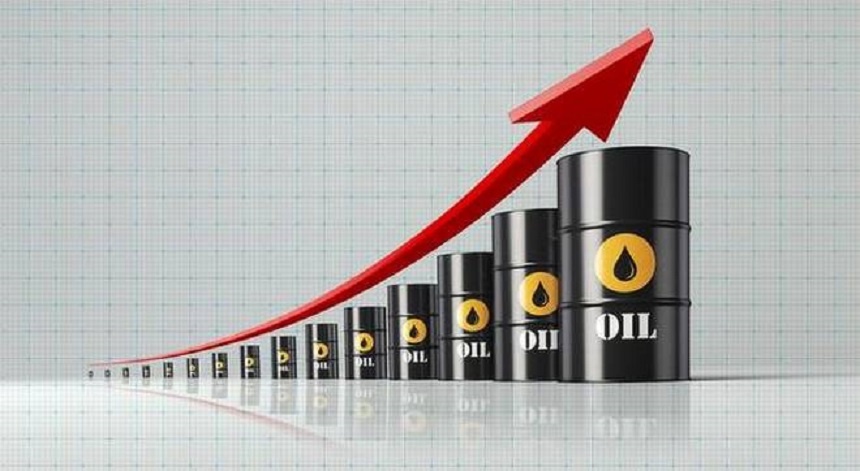Economy
Oil Sheds 2% on Possible Delays in US Interest Rate Cuts

By Adedapo Adesanya
Oil fell by more than 2 per cent on Friday on a possible interest rate cut delay in the US, as Brent crude futures lost $2.05 or 2.5 per cent to trade at $81.62 a barrel, and the West Texas Intermediate (WTI) crude futures declined by $2.12 or 2.7 per cent to $76.49 per barrel.
According to US Federal Reserve Governor, Mr Christopher Waller, the central bank policymakers should delay the country’s interest rate cuts by at least another couple of months.
The market reacted negatively as this could slow economic growth and curb oil demand.
The US Federal Reserve has held its policy rate steady in a 5.25 per cent to 5.5 per cent range since last July.
This is coming as most central bankers were worried about moving too quickly to ease policy.
Some analysts, however, say demand has remained largely healthy despite the impact of high interest rates, including in the US.
For the week, Brent declined by about 2 per cent and WTI fell more than 3 per cent. However, indications of healthy fuel demand and supply concerns could revive prices in the coming days.
Also, talks of a truce in Gaza were underway in Paris in what appears to be the most serious push in weeks to halt the conflict in Palestine and see Israeli and foreign hostages released.
Ceasefire talks could prompt the market to anticipate an easing of geopolitical tensions, making prices weaker.
However, tensions in the Red Sea continued, with attacks by Iran-backed Houthi militants near Yemen on Thursday forcing more shipping vessels to divert from the trade route.
The Organisation of the Petroleum Exporting Countries and its allies, OPEC+ group has not announced its official Q2 plans, but analysts are betting on the group extending its oil production cuts beyond the first quarter of 2024 into the next quarter.
A new Bloomberg survey revealed on Friday that OPEC+ will be forced to extend the cuts into Q2 2024.
While most of those surveyed feel that OPEC+ is likely to extend their cuts into the next quarter, others feel that OPEC+ may increase their production cuts, after some of its members—including Iraq and Kazakhstan—continued to overproduce in January.
US energy firms this week added the most oil rigs since November, and the most in a month since October 2022, energy services firm Baker Hughes said, adding that the oil rig count, an early indicator of future output, rose by six to 503 this week, and increased by four this month.
Economy
Afriland Properties, Three Others Weaken NASD Exchange by 0.06%

By Adedapo Adesanya
Four price losers weakened the NASD Over-the-Counter (OTC) Securities Exchange by 0.06 per cent on Wednesday, January 28.
The decliners were led by Afriland Properties Plc, which lost N1.53 to close at N14.50 per share compared with the previous day’s N16.03 per share, Geo-Fluids Plc dropped 50 Kobo to end at N6.35 per unit versus Tuesday’s price of N6.85 per unit, Central Securities Clearing System (CSCS) Plc declined by 35 Kobo to N40.15 per share from N40.50 per share, and Food Concepts Plc decreased by 28 Kobo to sell at N2.72 per unit versus N3.00 per unit.
As a result, the market capitalisation of the bourse went down by N1.3 billion to N2.173 trillion from the N2.174 trillion it ended a day earlier, and the NASD Unlisted Security Index (NSI) fell by 2.17 points to 3,632.56 points from Tuesday’s 3,634.73 points.
In the midst of the profit-taking, some securities witnessed bargain-hunting, with Nipco Plc gaining N22.00 to close at N242.00 per share versus N220.00 per share of the previous session, FrieslandCampina Wamco Nigeria Plc improved by N4.00 to N68.00 per unit from N64.00 per unit, and Acorn Petroleum Plc added 8 Kobo to finish at N1.38 per share versus N1.30 per share.
At midweek, the volume of securities transacted by the market participants surged by 259.9 per cent to 4.7 million units from 1.3 million units, but the value of securities went down by 8.6 per cent to N52.4 million from N57.3 million and the number of deals shrank by 15.8 per cent to 32 deals from 38 deals.
CSCS Plc remained the most traded stock by value (year-to-date) with 15.3 million units exchanged for N622.4 million, followed by FrieslandCampina Wamco Nigeria Plc with 1.6 million units valued at N108.4 million, and Geo-Fluids Plc with 8.9 million units worth N60.3 million.
CSCS Plc was also the most traded stock by volume (year-to-date) with 15.3 million units sold for N622.4 million, followed by Geo-Fluids Plc with 8.9 million units exchanged for N60.3 million, and Mass Telecom Innovation Plc with 8.4 million units traded for N3.4 million.
Economy
Naira Trades N1,400 Per Dollar at Official Market

By Adedapo Adesanya
The Naira was exchanged at N1,400.28 per Dollar in the the Nigerian Autonomous Foreign Exchange Market (NAFEX) on Wednesday, January 28 after it gained 74 or 0.05 per cent against the United States Dollar, according to data from the Central Bank of Nigeria (CBN). In the preceding trading session, the value of the local currency stood at N1,401.22/$1.
However, the domestic currency further depreciated against the Pound Sterling in the official market yesterday by N4.15 to end at N1,929.99/£1 compared with Tuesday’s closing price of N1,925.84/£1 and against the Euro, it lost N3.31 to settle at N1,675.53/€1, in contrast to the preceding session’s closing price of N1,672.22/€1.
At the black market window, the Nigerian Naira maintained stability against the Dollar at N1,480/$1 at midweek, same at the GTBank forex desk, where it closed flat at N1,426/$1.
The Naira has sustained its upward momentum into early 2026, building on the gains recorded in 2025, when it posted its strongest performance in over a decade. Recent reforms in the FX market as well as structural reforms in the oil sector have eased fears and buoyed investments.
This has boosted foreign capital inflows and led to stronger diaspora remittances, keeping the exchange rate at the N1,400 mark in the medium term.
Also boosting the value of the Naira is a general weakening of the greenback in the international market as a result of geographical tensions and risk associated with US policies.
As for the cryptocurrency market, continued strength in commodities, especially record-high gold and elevated silver and copper, have overshadowed crypto markets. A weaker Dollar fueled strong rallies in these commodities, making them safer havens than crypto.
Also, the US Federal Reserve left interest rates unchanged at its meeting on Wednesday.
Solana (SOL) shrank by 2.9 per cent to $123.15, Dogecoin (DOGE) depreciated by 2.6 per cent to $0.1217, Litecoin (LTC) slid by 2.4 per cent to $68.10, Ripple (XRP) fell by 2.1 per cent to $1.87, Cardano (ADA) depleted by 1.9 per cent to $0.3506, Ethereum (ETH) went down by 1.8 per cent to $2,951.30, Bitcoin (BTC) dipped by 1.1 per cent to $88,118.29, and Binance Coin (BNB) slumped by 0.1 per cent to $889.03, while the US Dollar Tether (USDT) and the US Dollar Coin (USDC) remained unchanged at $1.00 each.
Economy
MTN, Oando, RT Briscoe 35 Others Sink Local Stock Exchange by 0.33%

By Dipo Olowookere
The Nigerian Exchange tasted another defeat on Wednesday after it closed lower by 0.33 per cent due to profit-taking, especially in MTN Nigeria, Oando, UBA, and others.
The selling pressure was triggered by the desire of investors to recaliberate their portfolios and this saw 38 shares end in the red territory as only 32 shares finished in the green side, implying a negative market breadth index and weak investor sentiment.
According to data from Customs Street, RT Briscoe suffered the heaviest lost after it shed 9.97 per cent to trade at N6.50, May and Baker depreciated by 9.96 per cent to N35.25, Ikeja Hotel slumped by 9.92 per cent to N32.25, Living Trust Mortgage Bank lost 9.90 per cent to settle at N4.64, and eTranzact dipped by 9.16 per cent to N17.35.
At the other side of the coin, Union Homes REIT was the biggest price gainer after it improved its value by 9.97 per cent to N94.85, Deap Capital grew by 9.97 per cent to N9.49, Tantalizers appreciated by 9.92 per cent to N3.88, and SAHCO advanced by 9.91 per cent to N128.60.
Leading the activity chart yesterday was Neimeth, which traded 58.1 million equities for N590.6 million, Chams sold 39.4 million stocks worth N190.6 million, Access Holdings exchanged 33.4 million shares valued at N757.5 million, Zenith Bank transacted 32.4 million equities worth N2.3 billion, and Tantalizers recorded a turnover of 29.2 million shares valued at N109.8 million.
At the close of transactions, 631.2 million stocks exchanged hands for N16.5 billion in 42,172 deals at midweek compared with the 483.1 million stocks worth N17.4 billion recorded in 41,499 deals a day earlier, showing a fall in the trading value by 5.17 per cent, and an increase in the trading volume and number of deals by 30.66 per cent and 1.62 per cent apiece.
As for the key performance indices, they were down, with the All-Share Index (ASI) losing 549.44 points to settle at 165,164.38 points compared with the preceding say’s 165,713.82 points and the market capitalisation giving up N352 billion to end at N105.737 trillion versus Tuesday’s N106.089 trillion.
-

 Feature/OPED6 years ago
Feature/OPED6 years agoDavos was Different this year
-
Travel/Tourism9 years ago
Lagos Seals Western Lodge Hotel In Ikorodu
-

 Showbiz3 years ago
Showbiz3 years agoEstranged Lover Releases Videos of Empress Njamah Bathing
-

 Banking8 years ago
Banking8 years agoSort Codes of GTBank Branches in Nigeria
-

 Economy3 years ago
Economy3 years agoSubsidy Removal: CNG at N130 Per Litre Cheaper Than Petrol—IPMAN
-

 Banking3 years ago
Banking3 years agoSort Codes of UBA Branches in Nigeria
-

 Banking3 years ago
Banking3 years agoFirst Bank Announces Planned Downtime
-

 Sports3 years ago
Sports3 years agoHighest Paid Nigerian Footballer – How Much Do Nigerian Footballers Earn



















